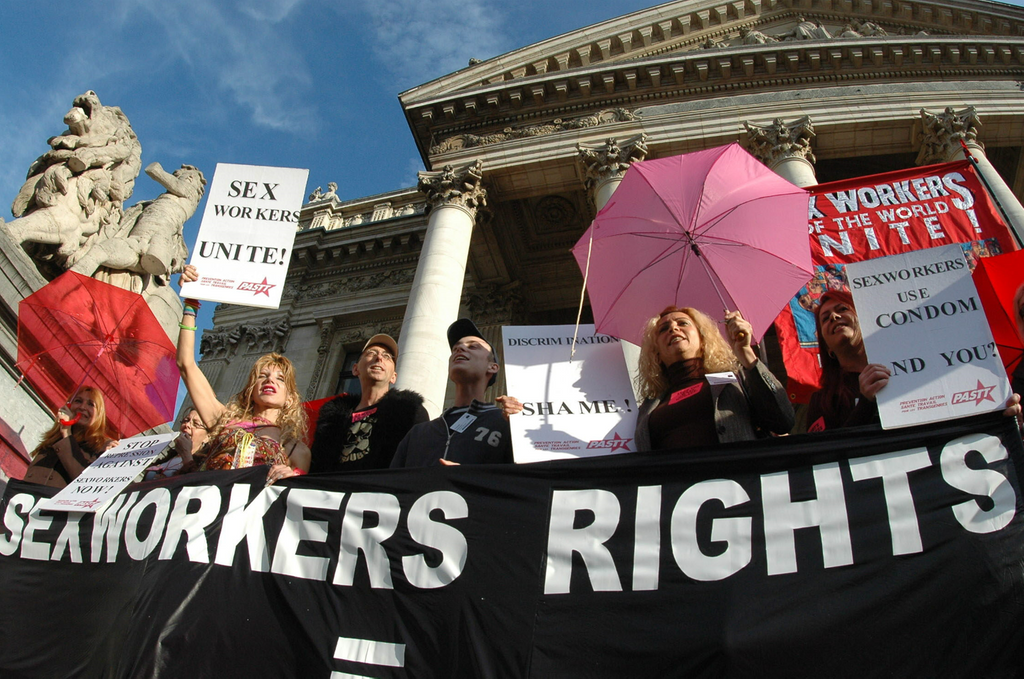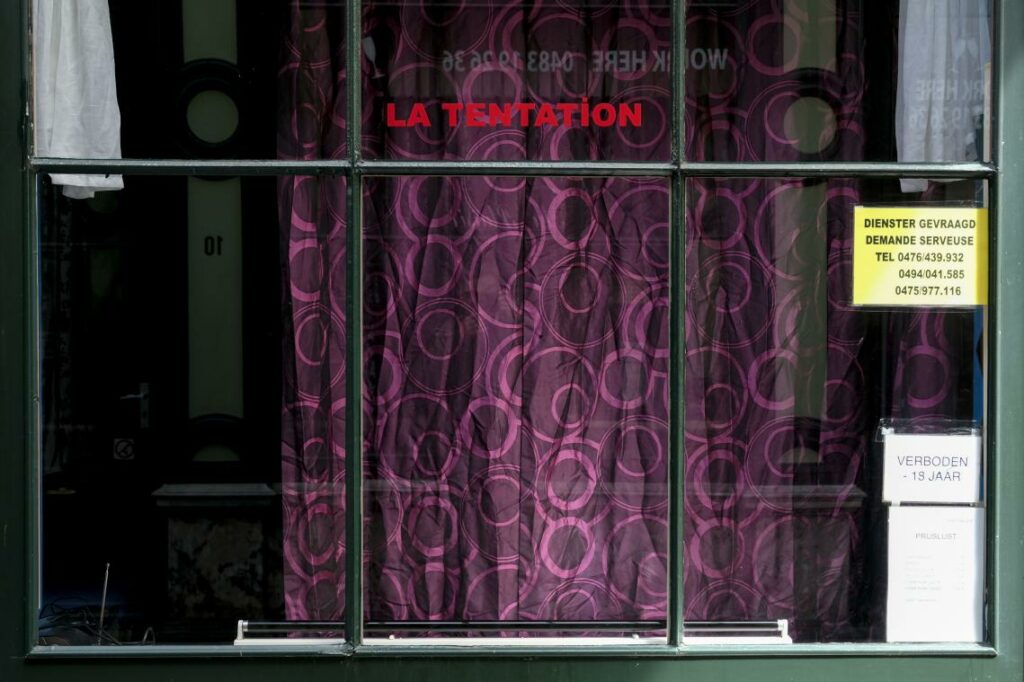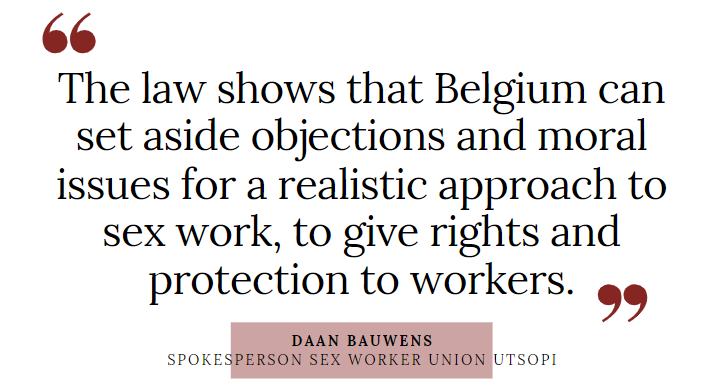After Belgium became the first country in Europe to decriminalise sex work in 2022, it is now the first in the world to approve a labour law for sex workers with an employment contract, announced the union for sex workers in Belgium (UTSOPI).
The Belgian Parliament approved the labour law for sex workers under contract on Friday, with 93 votes in favour, 33 abstentions and zero votes against – marking the end of years of intense lobbying from the sex work sector.
"This law is a world first. I cannot stress enough how important this is," UTSOPI spokesperson Daan Bauwens told The Brussels Times. "The Federal Government has listened to the needs of sex workers and has started writing this law with an enormous openness."
For Bauwens, the text shows "the extent to which our country has set aside certain objections and moral issues for a realistic approach to sex work, to give rights and protection to workers."

Credit: Belga / Jacques Collet
While self-employed sex work was already possible in Belgium (after the government decriminalised it in 2022), sex workers will now also be able to work under an employment contract, giving them access to social security (pensions, unemployment/family benefits, health insurance and annual/maternity leave).
The law also ensures that sex workers are protected against job-related risks, and imposes conditions on employers. "With this model, Belgium is really demonstrating that it aims to protect sex workers, regardless of any moral judgements about the profession people may have," Bauwens said.
Historic step
This law is a historic step in the battle for sex workers' rights; countries that recognised sex work before Belgium (Germany, the Netherlands, New Zealand) never established a specific legal framework for labour, despite the fact that it is necessary for a respectful, fair relationship between sex worker and employer.
Thanks to Belgium's new law, however, sex workers who signed an employment contract will gain additional workers' rights while their employers must meet certain obligations. Importantly, the law only covers physical sexual contact, but does not mention pornography, striptease or webcam acts.
The law seeks to protect sex workers by ensuring that they have the right to refuse a client, refuse a sexual act, interrupt a sexual act at any time, perform a sexual act in the manner they wish, and to refuse to sit behind a window or advertise if there are dangers to their safety.

Credit: Belga
If a sex worker invokes any of these rights, they are protected from dismissal or other adverse action by the employer. If a sex worker exercises the right to refuse more than ten times in a six-month period, the sex worker or the employer may seek the intervention of a governmental mediation service.
Sex workers may also decide to end their contract at any time, without compensation or a notice period. Additionally, when sex workers voluntarily end their contracts, they do not lose their right to unemployment benefits.
The law also lays down several obligations for employers. They must apply for recognition and are eligible if they have a registered (branch) office in Belgium. They must not have previously been convicted of a crime such as voyeurism, sexual assault, abuse of prostitution, extortion or murder, among others. A complete list can be found here.
Good foundations
After an employer is recognised, they must ensure that a reference person (internal or external) is always available to ensure that the sex work is organised safely. The employer must also provide the sex worker with an alarm button (either in the room where the sexual services take place, or a mobile one if the services take place elsewhere).
Unions, sex worker support organisations and the professional organisation of sex workers should have access to the workplace at all times.
"We hope that this can lead to a reversal of the recent trend of criminalising clients in Europe (such as in Sweden and France)," Bauwens stated. "We hope that other countries will copy this text, as they did on topics such as same-sex marriage, abortion, euthanasia and transgender rights."
This law is the basis that applies to the entire sex sector. Within the law, there are three things that still need to be decided, which will be done through three Royal Decrees.
One of the Royal Decrees is expected on the practicalities of the recognition procedure; another will focus on the minimum dimensions of rooms, the maximum number of sex workers per room and hygiene in the workplace; and the final decree will be on the mediation service that will intervene when a sex worker frequently exercises the right to refuse a client or sexual act, etc.
Many sex workers fear a loss of their anonymity or their chances of securing a future job if their contract mentions sex work. As plans stand, sex workers' anonymity will be guaranteed. Sex workers will be able to work under hotel-restaurant-café (HoReCa) contracts that do not mention sex work.
This law is a huge step forward, ending legal discrimination against sex workers by allowing a full-fledged contract, Bauwens stressed. But there are still risks involved.
Recognising red flags
The new rules are aimed at giving sex workers full social protection and eliminating rogue employers or exploiters, but the clarity of the new regulations can also be instrumentalised in reducing or eliminating sex work. Certain municipalities already use terms such as 'safety' and 'hygiene' to promulgate very strict local regulations that make sex work almost impossible on their territory.
"We are currently talking with different municipalities to look into implementing this framework. The fact that we, as a sex worker organisation, are part of the decision making is extremely important," Bauwens stressed. "We are focusing on safe reporting: someone who is in the country irregularly should not be detained if they report to the police."
UTSOPI is in dialogue with experts, the social inspection and city councils to weigh in on the new policy. "For independent sex workers too, we need to ensure that they start recognising the red flags of exploitation. We need to make sure that the new laws benefit all sex workers and do not negatively impact the most vulnerable."


